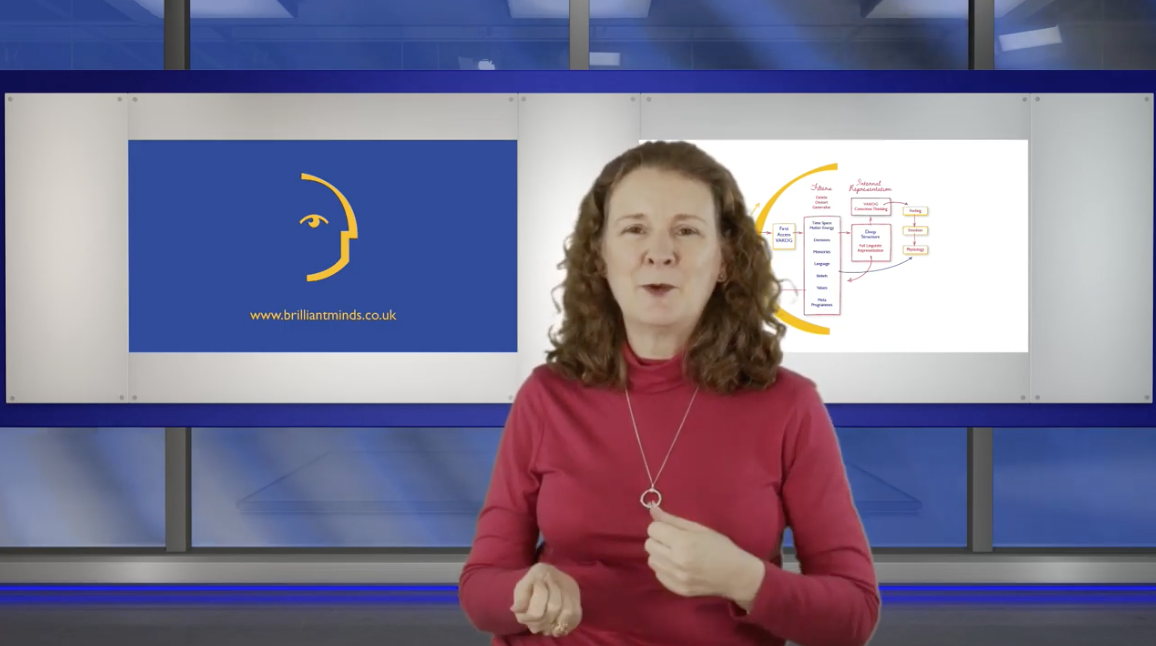Chapter 1: What is NLP?
I have often been asked, ‘How did you get into teaching NLP?’
The story started in 1991. I was the UK Head of Training for Interflora and the only L&D professional in the organisation.
I used to go to a lot of conferences and networking events to keep up with what was going on in the profession.
At one event, I was chatting with someone over lunch and she asked me, ‘Have you ever done any NLP?’
‘No.’ I replied. ‘What is it?’
She wasn’t able to give me a clear answer to the question but knew someone who was learning about NLP and she had the impression it was useful.
A few weeks later I was at another event (I told you I went to a lot of events!) and there was an announcement at the start of the day that there would be an additional session in the lunch break – An Introduction to NLP.
This was my chance to find out more!
I arrived at the room set aside for this talk and found myself crowded in with about twice as many people as the room could comfortably accommodate. Clearly I wasn’t the only person who wanted to find out more…
I left half an hour later no wiser.
The speaker had struggled to explain anything about NLP, hadn’t defined it in any way and had left most of his audience very frustrated.
I mused on this…
Clearly the speaker felt strongly about the value of NLP. Otherwise, why would he have volunteered to run the session? Why would he have struggled through despite the obvious lack of success in making his point?
I concluded that there must be SOMETHING in it…
Fortunately for you, there is a very clear explanation of ‘What is NLP?’ available to you.
Chapter 2: If in doubt, read a book
After my frustrating experience of attending a short talk that was billed as ‘An Introduction to NLP’ and yet learning absolutely nothing… (see part 1)
…well nothing apart from the fact that I really wanted to find out about NLP…
I did what I usually do.
We’re all creatures of habit. In fact there’s a big chunk of NLP that is about habits – how to create new ones, how to ditch bad ones and how to tweak them so they serve us really well.
But I’m getting ahead of myself.
My habit back in 1991 (and still to this day) was that if I wanted to know about something I’d read a book on the subject.
Remember, in 1991 there was no internet, let alone Google or YouTube. My options were limited. And even more limited by the fact that there were fewer than 50 NLP books in print and most of them weren’t available in the UK!
Eventually I found a book by a pair of English authors. I can’t remember how I came across it and I think I bought it by mail order. There was no amazon back then!
I then ploughed through the book. It’s a really comprehensive introduction and it’s well-written. But there was a problem…
NLP is a set of skills.
The value of NLP is in doing it.
The theory is interesting, but until you actually do it or see it done, it’s quite hard to grasp.
So, I enjoyed the book but I found I had lots of questions and nobody to answer them…
Having said that, if you’re like me and your first choice is always to read a book, I can help with that.
My book ‘A Practical guide to NLP for Work’ was published in 2012 and has been translated into several other languages for sale around the world. What I’m most proud of is the fact that the publisher approached me and asked me to write it.
It was written as an introduction to the subject, so it’s not as weighty as the first NLP book I read but it will answer most of your questions and it includes some practical exercise for you to try out.
You can get your copy here:
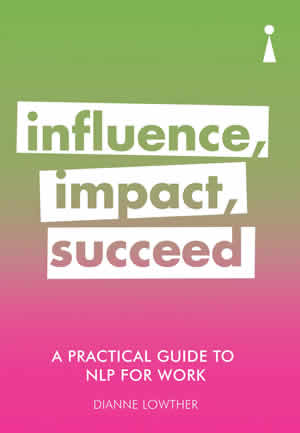
Chapter 3: The Introductory Course
After my frustrating experience of attending a short talk that was billed as ‘An Introduction to NLP’ and yet learning absolutely nothing… (see part 1)
…and reading a book that left me with more questions than answers (see part 2)
…I decided to attend a course.
I remember the leaflet that described the course and told me how to book. I vaguely remember writing the cheque and putting it in the post. I have no recollection of how I came across the leaflet. Maybe it was an advert in one of the professional journals.
Remember, this was 1991. No Internet, no Google, no YouTube, no online payments. I didn’t even have email!
Anyway, I signed up for a weekend introductory course along with a friend who was similarly intrigued by the subject. He had also read the same book as me and was ready to get some first-hand experience.
…and what an experience it was!
I still have the course notes. We learned some of the basic principles of NLP. We learned about Rapport and sensory preferences, how to create a well-formed outcome and something billed as ‘the keys to wisdom’. I watched an amazing demonstration of a process that re-patterned the thoughts of someone who had an irrational fear of needles so they could entertain the idea of having a flu jab.
Most of all, I learned that it was possible to achieve some kind of mastery of what went on in my head and to enjoy choice about the way I act and react.
I think it’s fair to say I was hooked!
If my story is stimulating your curiosity and you’d like to explore what NLP can do for you, I’m running two Introductory days in March.
The first is on Saturday 16th March – your pick if the weekend is best for you.
The second is on Wednesday 20th March – if you can spare the time out of the working week.
Click here for the details:
https://www.brilliantminds.co.uk/event/introduction-to-nlp-day/
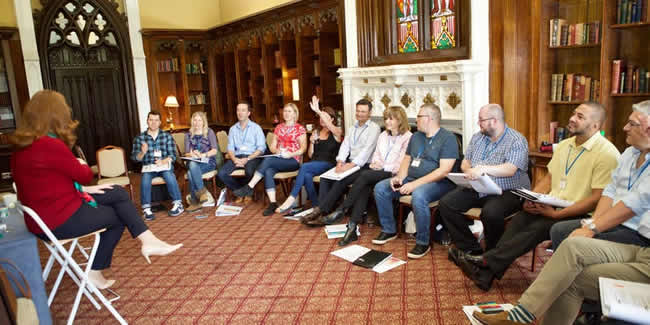
Chapter 4: Practice makes perfect
I attended the NLP Introductory course in January 1991…
As I said in the previous ‘episode’, I was hooked. Having read a book before the course, I’d had a lot of questions and felt as though I hadn’t really ‘got it’. Attending the course brought the subject to life for me and different aspects began to fall into place.
I’m a compulsive reader. That means I can’t ignore the written word. I read everything – not just books and articles, emails and magazines. I read planning notices on telegraph poles, the back of cereal packets, ‘instructions for use’ and ‘how to assemble’ leaflets…
… so, OF COURSE I read my course handouts.
…and I quote:
‘We believe that this material represents the most effective skills for creating the kind of life that you want to. However, they are skills, and like all skills, they need developing with practice, until they become unconscious habits. If you do not practice, you will lose them.’
So I did. Practice, that is. I played with all the techniques I had learned and discovered a lot of useful applications. I followed the suggestions in the handouts about how to practice and I still pass on some of these suggestions to my own students over 30 years later.
As a result I became convinced that I wanted to learn more. I signed up to do the NLP Practitioner training programme. In 1992 there were only about 5-6 training companies offering NLP training so it wasn’t hard to choose one. (Now there are hundreds and they vary massively in their approach)
The only problem was that it didn’t start until September…
…as suggested, I practiced what I’d already learned. I read more books, beginning the collection that you can see behind me in my office when I’m on zoom. (As I’ve added to the books I’ve also met lots of the authors and some of them I now count among my friends)
I practiced and experimented with the NLP I knew. I read more NLP and I almost counted down the days to the start of Practitioner training. It was way more exciting than Christmas!
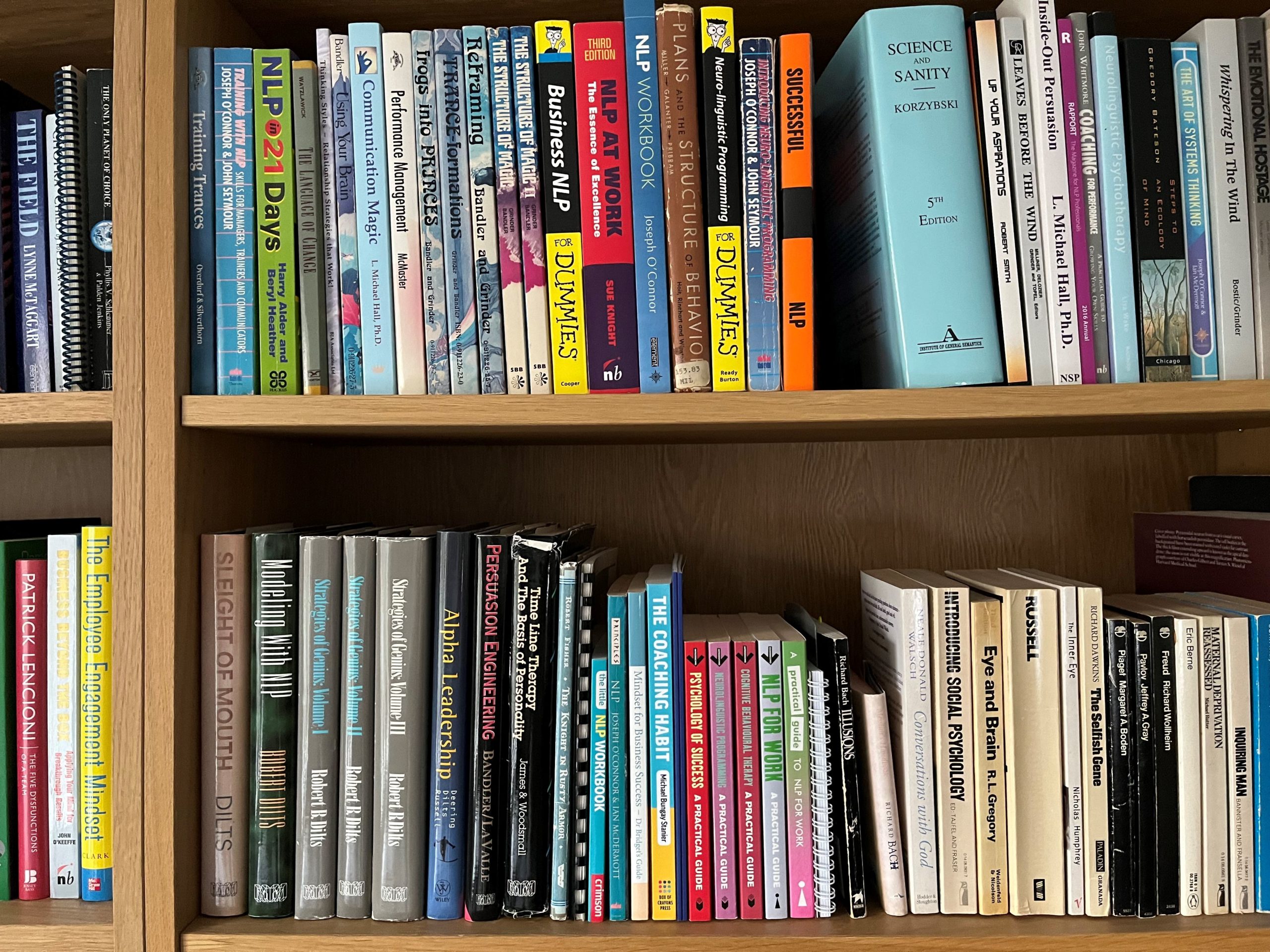
Chapter 5: The personal benefits of NLP Practitioner training
In September 1992 I embarked on what was to prove to be a life-changing experience. Which was not what I expected or why I signed up!
Back in part 1 I explained that my job at the time was UK Head of Training for Interflora. A venerable organisation with decades of history. It was my first encounter with corporate resistance to doing the ‘right’ or ‘sensible’ thing and my introduction to ‘we’ve always done it this way’.
Operating in a market about to be transformed by a combination of credit card payments and email (later by the internet as well) the leaders of the business were clinging to what they knew. That approach extended to learning and development and I was desperate to find ways to increase my influence and take the training function into the modern era.
So I enrolled for the NLP Practitioner training with my main focus on how it would help me understand and influence other people. How to introduce change painlessly and how to overcome the weight of history that seemed to me to be blocking progress. (Does any of this sound familiar?)
So, I was quite surprised when I realised that I was learning a lot about myself. Also that the more conscious choice I exerted over my language and behavour, the more influential I became.
Back to the personal benefits…
I learned a lot about myself. I experienced some major shifts in attitude. I got rid of some bad habits and mental blocks. I think I became easier to be around.
If you’d like more detail, here’s the link to an article I wrote on the subject, “What has NLP ever done for me?”
I also shared the experience with a group of people who became friends for life. We don’t see each other a lot, but when we do, it’s always a pleasure. (You know who you are and I know you read my posts)
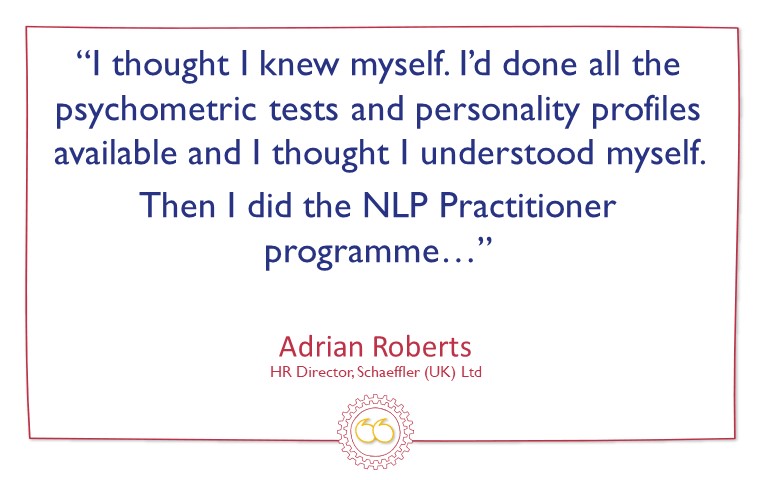
If you join my next Executive NLP Practitioner training, I can’t promise you ‘life-changing’ but I can promise you a thorough grounding in all the tools to change whatever aspects of life are not currently exactly how you want them to be. Is that enough to register your interest?
Chapter 6: The Business Benefits of NLP Practitioner training
Between September 1992 and January 1993 I participated in an NLP Practitioner training. I have to say I loved every day of it (twenty in total) and I learned so much that it’s hard to capture all the benefits and consequences of doing the course.
Bit by bit, I applied what I was learning to the daily challenges I faced in my job and gradually I increased my standing and influence. One standout achievement was persuading the powers-that-be to have our Interflora training manual printed by a well-known Publishing House and made available for purchase outside the organisation. There was opposition to that on the basis that we were ‘giving away trade secrets’ but I was able to sell the idea on the basis that the publishing house would pay us to produce it instead of it making a massive hole in my annual budget. To this day I believe it also increased the prestige of the brand.
Another high point was persuading the Membership team to do a survey of members in relation to the new store standards we were about to introduce. I was told that nobody would reply.
Over 800 of the 3000 members did reply and I read every single response. That put me in a great position to interpret the results and advise on the next steps…
So, I learned how to make a difference to organisational strategy and how to influence ‘upwards’.
But something else happened…
Out of the blue one day during the course, I looked at the trainer at the front of the room and realised, ‘that is what I want to do’.
I had never before had such a clarity about my personal or professional goals. I was still in my twenties (just) and suddenly I had a clear plan for the rest of my working life…
There’s no doubt in my mind that practicing NLP in your daily life and work makes you a more influential, effective and valuable employee. Last time I checked, 81% of the people in corporate jobs who did my NLP Practitioner training achieved a promotion within 12 months of completing the programme.
But that’s not all. Over the years I’ve seen and heard about countless successes – large and small – that my students and clients have enjoyed.
Here’s a link to watch the recording of a webinar called, ‘Four ways to increase business results with NLP’
The webinar is about 45 minutes long.
If you’d prefer to have a chat with me about how NLP might be relevant to you and what results you could achieve, register your interest here.
Chapter 7: Why is it 20 days?
In January 1993 I was awarded my NLP Practitioner certificate. I was very proud of the achievement and equally excited about my new skills and the possibilities for the future.
I didn’t want to ram it down the throat of everyone I met so I didn’t talk to many people about NLP at that stage. However, there were a few people who knew I’d been attending the course and were curious.
With them, I shared some of what I’d learned but I found it quite hard to express the value of the twenty-day programme in snippets short enough for the average attention span.
I also realised quite quickly that I’d had a lot of evidence that, once you know how to do it, it’s possible to change habits, ditch old attitudes and see the possibilities of life in a very constructive way. People who hadn’t been with me on the course were much less ready to accept that any of these things were possible.
I remember having a conversation with a woman of about my age who suffered with asthma. I’d had my own struggles with the condition and had been delighted to discover that I had made a real difference to the frequency of attacks by using one of the NLP techniques. I offered to share it with her.
She stared at me for a moment, frowned and then patted me on the arm and pronounced, ‘no, you see, I really do get asthma. It’s not in my mind.’ (There wasn’t much to say to that…)
A colleague told me, ‘I’d quite like to become an NLP Practitioner but I don’t want to do a twenty-day course. Can’t you just give me the main learning points?’
Well….
…no.
I’ve said this before, NLP is a set of skills. The NLP Practitioner training is about learning and practicing the skills. The theory might be interesting but until you learn to apply it, you’re not going to experience any of the benefits.
I also realised early on that it’s difficult for most people to envisage that there could be twenty days worth of material to do with communication and performance that they don’t already know. Let me assure you, unless you’ve actually studied NLP, you don’t already know any of it.
Thirty years on I still get asked, ‘why is it 20 days?’
I’ve been advised by marketing professionals that ‘nobody will buy a 20-day course’. That’s simply not true. You might not buy it on a whim, you’ll want to know what you’re getting and why. You’ll have to check the dates and find the budget.
One thing I’m sure of…
…if you’re tired of sitting in front of a screen and you’re craving something real, those 20 days will nourish your soul. I can’t think of a better way to reconnect with yourself, with other people and with the joy of being part of the human race.
…and before you sign up you might want to compare courses. At which point you might want to ask, ‘Why are NLP course all so different?’
Click below to find out why [it’s 20 days]…
Chapter 8: Practice, Practice, Practice
Receiving my NLP Practitioner certificate in January 1993 – yes, thirty-one years ago – was with hindsight more of a beginning than a completion.
It was a bit like passing my driving test. Once I had my license, my Dad remarked that NOW I would actually learn to drive. I understand what he meant. It’s only through experience that you gain confidence and refine your skills behind the wheel.
The same is true for NLP. As I’ve said before, NLP is a set of behavioural and cognitive skills. Once you’ve learned them, you practice to achieve the essential unconscious competence.
Having said that, the practice was easy. Every day I was interacting with other people, professionally and personally. Every interaction represented an opportunity to practice noticing the patterns in the behaviour of other people and the patterns in my responses. Every day afforded me countless opportunities to exercise the skills I had learned in how to use language effectively, how to build good working relationships and to influence others with integrity. Every now and then I’d be participating in a meeting or conversation and I’d hear myself say something then think, ‘wow, where did that come from?’ as my comment achieved exactly what I intended. I loved that!
I also used to meet up with a friend from the course and we would practice with some of the techniques for behavioural change, working on our bad habits, demotivators and limiting beliefs mainly for the fun of it.
I also occasionally attended a Practice Group. At that time, there were quite a lot of NLP Practice Groups around the UK and over the years I’ve been a guest speaker at about six different groups and they’re always a lot of fun. Sadly, they have largely fallen out of fashion or moved online.
Oh, and I continued to read more books. (Of course!)
Remembering how important those months after the NLP Practitioner training had been for me, when I started my own NLP training courses, I also created an online programme to help people use what they had learned and continue to refine their skills.
It’s called simply, ‘Use your NLP’ and you can take a monthly subscription or get the whole twelve modules in one go. It’s a great resource for reviewing what you’ve learned and has also been helpful for people who didn’t train with me to get an additional perspective on some of the material – especially as preparation for my NLP Master Practitioner programme.
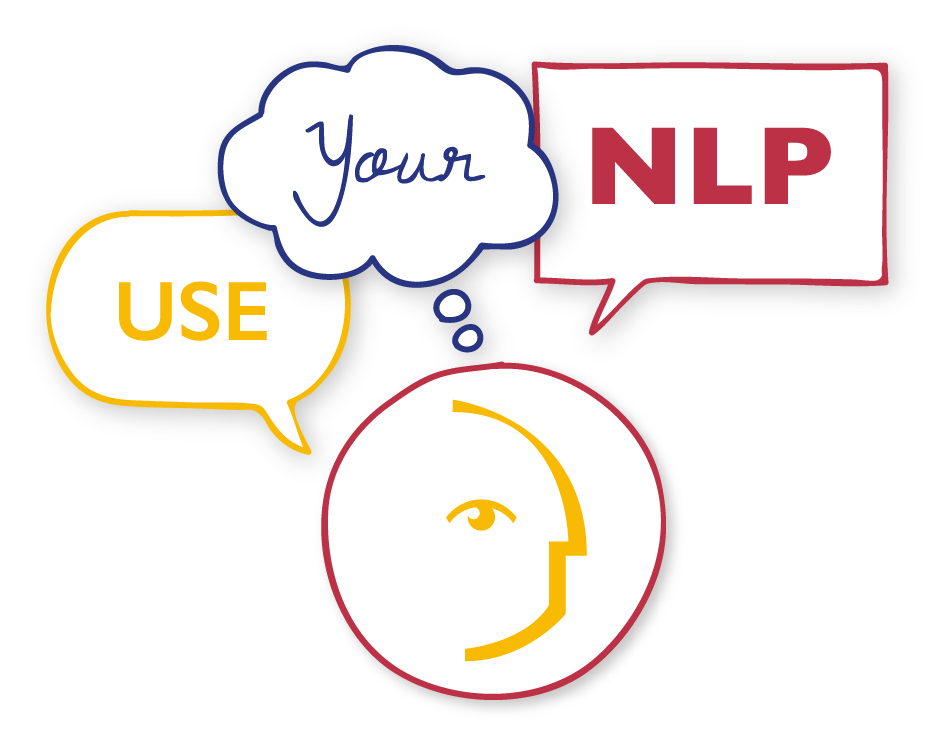
Here’s a link to the NLP Practitioner level:
https://academy.brilliantminds.co.uk/product/use-your-nlp-practitioner-level-monthly-subscription/
Of course, if you’re not yet certified as a Practitioner of NLP you might want to register your interest for the next programme…
Chapter 9: NLP Master Practitioner
I was always going to sign up for the NLP Master Practitioner. Not only had I loved the Practitioner training and gained a huge amount in terms of personal and professional development, I’d also formulated a long term plan to become a Trainer of NLP myself.
Becoming a Master Practitioner was the obvious next step in that but even without that long term goal, I was keen to learn more NLP.
I waited a year between courses. I didn’t want to rush the process and at the end of the Practitioner course I felt that I had so much to work with and master that I was content to leave a gap.
I was very fortunate that a lot of friends from the Practitioner course did the same and we enjoyed a second adventure together.
Other friends and colleagues were more likely to look askance. ‘Another twenty days?’
Yes, another twenty days. Another twenty action-packed, enthralling, exciting and productive days learning to work at a deeper level of the psyche and with more complex behavioural patterns.
We worked with more than one trainer this time and had the benefit of slightly different approaches in some areas. I didn’t want it to end.
Thirty years later, people sometimes ask me what the Master Practitioner programme can add – given that the NLP Practitioner programme is such a rich experience.
The way I see it, the Practitioner level training opens up possibilities. You learn how to manage yourself exquisitely. You get past old mental blocks, self-doubts and demotivators. You start to view anything and everything as achievable, possible.
What happens on the Master Practitioner programme, is about exercising that new-found choice. If anything is possible, what is important to you? Where do you want to spend your time and energy? What do you want to achieve? In what areas do you want to excel?
Anything may be possible but each of us has a finite amount of time and energy. We can’t do everything, but we can do what matters. The clarity about what really matters is the greatest gift of the Master Practitioner programme…
You can get all the details about the Brilliant Minds Executive NLP Master Practitioner programme here:
https://www.brilliantminds.co.uk/executive-nlp-master-practitioner/
Or if you’re still at the stage of wondering about signing up for the Practitioner training you can register your interest here.
Chapter 10: Multiple perspectives
I received my Master Practitioner certificate in the Summer of 1994. I had recently started a new job, my first consulting role, with TMI, and life was busy – to say the least!
However, I still had my eye on the goal to run my own NLP Training business and the next step was to broaden my knowledge and skills. Some people might have gone straight into NLP Trainers’ Training at this point but I was more focused on building up my skills.
I therefore embarked on a period of attending shorter courses and also volunteering as a Trainer’s Assistant with various different NLP Trainers – something I continued even after I qualified as a Trainer myself.
This is for you if you’re considering doing Master Practitioner with me. I’ve trained with all of the following (some more than others!):
- Richard Bandler
- John Grinder
- Robert Dilts
- Ian McDermott
- Sue Knight
- Gene Early
- Christina Hall
- Tad James
- John Overdurf and Julie Silverthorne
- Shelle Rose Charvet
My apologies if the names don’t mean anything to you. They are some of the best and most experienced NLP trainers in the world and I count myself very fortunate to have been able to learn from all of them.
This is important, because there is a key principle in NLP relating to taking account of multiple perspectives. There is rarely only side to a discussion and hardly ever an opinion that are universally held. NLP is no exception – there are lots of different ‘takes’ on the same material and no-one has the monopoly on ‘right’ answers.
One of the main skills I learned in those early days was how to see things from another point of view. And another. This helps with communication, influence and problem-solving. I’ll admit I got so good at it at one stage that I had trouble choosing a point of view and sometimes didn’t really know what I thought on a number of subjects!
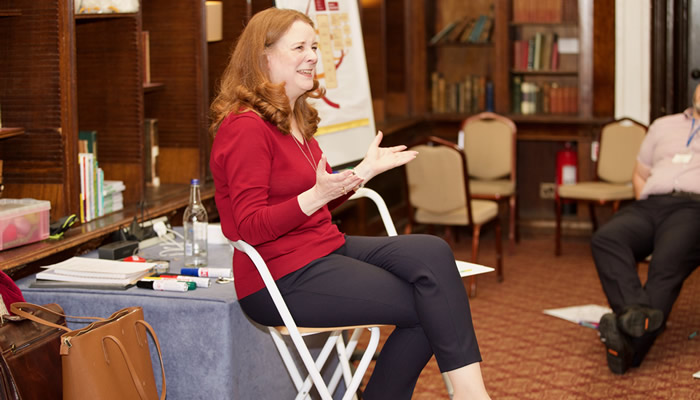
One opinion I haven’t ever changed is that NLP is a really valuable toolkit for anyone who holds or aspires to a leadership role.
In my view, leadership is all about getting the best out of yourself and other people. That comes from both self-awareness and great interpersonal skills.
Here’s that link again to read all the details about the NLP Practitioner programme:
https://www.brilliantminds.co.uk/executive-nlp-practitioner/
Or if you’d prefer to have a chat with me, register your interest here.
Chapter 11: Achieving the goal
In January 1993 I was awarded my NLP Practitioner certificate.
In June 1994 I was awarded my NLP Master Practitioner certificate.
In August 1996 I achieved certification as a Trainer of NLP.
When it came to it, I wasn’t focused on the certification. I knew it was a tough course and it included 4 days of assessment including written exams.
My frame of mind going into the course was that I wanted to learn everything I could about how to use NLP to become a more effective trainer and if I also got the certification to teach NLP, that would be a bonus.
At this stage, I’d been earning my living as a professional trainer for about eight years. I’d been learning NLP for four and I’d been assisting established NLP trainers for two years.
So I was a bit surprised to find myself learning alongside some people who had no experience – I do mean literally no experience – of training anyone in anything.
I was also surprised to find that there were people in the room who had done their NLP Practitioner training only months before and Master Practitioner a few weeks earlier.
Let’s just say I had a very different learning experience from some of those others. I had no stage fright to conquer, no anxiety about someone asking me a question I couldn’t answer. My NLP knowledge was solid. (I actually scored 100% in the written tests – more if you count the bonus marks but I don’t like the idea of 110% correct)
I came home with my certificate, a massive boost to my confidence and a renewed commitment to running my own NLP training business.
…and the rest, as they say, is history.
My boss at the time, Chris Lane at TMI, provided me with the perfect transition into self-employment. He suggested I resign my position and then continue as an Associate so that I had more control of my own calendar as well as a steady income while I built up my own business. Without his support, I might never have made the switch. I’m not a great risk-taker and I’m not a great entrepreneur either.
Sometimes, the pieces of the puzzle fall together easily and I’m grateful that it was like that for me.
I ran my first NLP Practitioner training in 1997.
The photograph below is me presenting my first NLP Practitioner certificate. (I know it’s a poor quality photo but it was 1997. I didn’t have a digital camera and iPhones didn’t exist) Angie was the first person to book on the course, so she got her certificate first too. (I’d forgotten just how much hair I used to have!)
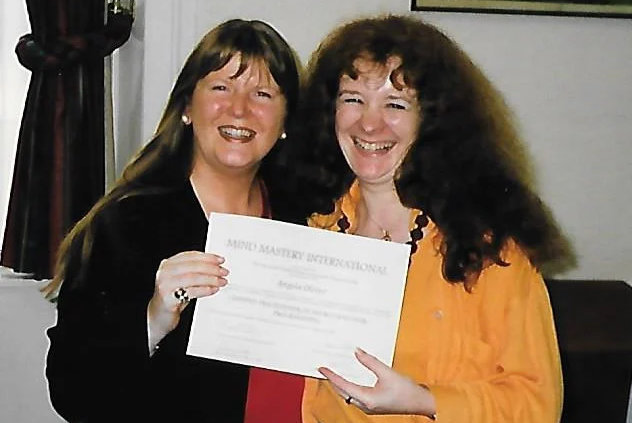
My next NLP Practitioner training starts in April 2024.
I’ve said this before…
…if you’re tired of sitting in front of a screen and you’re craving something real, those 20 days will nourish your soul. I can’t think of a better way to reconnect with yourself, with other people and with the joy of being part of the human race.
Get all the details here:
https://www.brilliantminds.co.uk/executive-nlp-practitioner/
Or if you’d prefer to have a chat with me, register your interest here.
Chapter 12: The final chapter - for now
This is a never-ending story. Over thirty years since I first herd about NLP, it continues to fascinate me and I still love teaching it to other people.
In 2009 I qualified as a Master Trainer of NLP. That involved putting together a portfolio of evidence and that was when I realised that I’d done the 10,000 – and then some – hours that Malcolm Gladwell identified as the requirement for mastery of a skill.
In 2012 I was approached by Icon Books, who asked me to write a book for their popular ‘Introducing…’ series. My topic was NLP for work.
In 2015 I was invited to join the NLP Leadership Summit.
In 2018 I attended a meeting of the NLP Leadership Summit in Spain. There were about 70 people there – all NLP trainers who had been in the field for at least 15 years and all having made a unique contribution to the field. Some of them are the authors of the books in my office.
On the first evening I was chatting to someone I hadn’t met before. She was part way through running her first solo Practitioner course.
‘Oh,’ I said, ‘I think running NLP Practitioner training is the best job in the world.’
Later that evening, back in my room I reflected on that. I still think that running NLP Practitioner training is the best job in the world. I resolved to do more of it…
It’s also been pointed out to me, that if I think it’s the best job in the world I’m probably going to be at my best when I’m doing it.
That may be true. I certainly think it’s what I’m best at and I think maybe you get a better idea of who I am when you learn NLP from me. But that might be for others to judge.
I hope you’ll join me in April for the next programme. The details are here:
https://www.brilliantminds.co.uk/executive-nlp-practitioner/
Or if you’d prefer to have a chat with me, register your interest here.
